The Ghost Writer
 for language, brief nudity/sexuality, some violence and a drug reference.
for language, brief nudity/sexuality, some violence and a drug reference.
Reviewed by: Scott Brennan
CONTRIBUTOR
| Moral Rating: | Offensive |
| Moviemaking Quality: |
|
| Primary Audience: | Adults |
| Genre: | Mystery Political Thriller Drama |
| Length: | 1 hr. 35 min. |
| Year of Release: | 2010 |
| USA Release: |
February 19, 2010 (limited—4 theaters) March 5, 2010 (expanded) March 16, 2010 (expanded) DVD: August 3, 2010 |
| Featuring |
|---|
|
Ewan McGregor Pierce Brosnan (Adam Lang) Kim Cattrall (Amelia) Olivia Williams (Ruth Lang) Timothy Hutton Eli Wallach (Vineyard old man) Tom Wilkinson James Belushi Jon Bernthal (Rick) See all » |
| Director |
|
Roman Polanski |
| Producer |
|
RP Films France 2 Cinéma See all » |
| Distributor |
A ghostwriter is a writer who writes on a topic assigned to them-under someone else’s name-but with their consent. It’s commonly done, especially for notable politicians who want to write their memoirs but aren’t always skilled at penning them in a format that will appeal to the reading public. This is the backdrop of the title of Roman Polanski’s latest feature film by the same name. The “Ghostwriter” in this case is believably portrayed by Scottish film star Ewan McGregor (Star Wars Episodes ll and lll) who is hired by the British prime minister Adam Lang (Pierce Brosnan) to assist him in completing the task of writing his legacy in book form—especially since that task was left “undone” by the mysterious death of Lang’s previous Ghostwriter—which we find out in the opening of the film. Oddly, McGregor’s character doesn’t even have a name in the script, and I’m guessing that is by design to add to the specter-quality of the movie.
The film begins with what would appear to be the elements of a delicious mystery-spy-drama-with-political-intrigue, but unfortunately, the script is soon bogged down in proverbial mud, much like a bicycle scene in the movie where McGregor decides to do a little investigating on his own around Martha’s Vineyard in the middle of winter and he gets “stuck in the mud” during a heavy rainstorm. My hunch is that much of this drudgery and awkwardness may have to do with the translation and adaptation of this screenplay from its source, British best-selling author Robert Harris’s 2007 book The Ghost. Reducing a novel to a two hour screen play is a difficult feat all on its own, but even more so when the writing is done by both the movie’s director (Polanski) and the original author (Harris). The bottom line is: (and I cannot speak for the book) the screenplay didn’t work.
The predictable plot—in two or three sentences—goes as follows: Ex-prime minister Adam Lang (Brosnan) is cooped up on Martha’s Vineyard in Massachusetts, in a holiday seaside estate—trying to get his memoirs written before a deadline. Lang’s former press aide and ghostwriter mysteriously drowns early in the film. A new “ghost “is hired (McGregor) by the publisher for a sum McGregor can’t pass up—although after an immediate mugging, he wants to quit right away. After taking the job, McGregor stumbles on to some artifacts from Lang’s past and clues to a mystery which make him question the death of his “ghost” predecessor. Before he realizes it, he’s in too deep and there appears to be no way out of the box. This occurs just as the World Court begins seeking to “try” the ex prime minister for alleged war crimes (promoting the torture of detainees during the Iraq War).
Essentially, this is a thinly veiled anti-war movie that will, in the long run, appeal only to those suffering from BBDS—a disease that bloggers refer to as “Bush Blair Derangement Syndrome,” meaning that “It’s all their fault!” It’s quite obvious that Adam Lang was supposed to be Tony Blair and other references in the script are to the 1) Bush administration, 2) an evil company called “Heatherton” (oddly similar in sound to “Haliburton”—Boring!), and even to a 3) black female ambassador who was the spitting image of Condoleezza Rice in the film. (Yawn!) Frankly, I’m bored of these Michael-Moore-anti-establishment-anti-American-anti-conservative type films that continue to find their way into the theaters. If only they (Harris and Polanksi) would have stuck to a mystery plot that actually went somewhere instead of a political diatribe against America, the CIA and anyone else that might support the protection of innocents from worldwide terrorists. It strikes me odd that in the film, like in real life, “The Hague” would be more concerned about water-boarding by law abiding citizens, than it would be about terrorists who kill and behead innocents and film it for internet viewing. It’s a strange dichotomy –like PETA supporters who would be outraged if you trained a seal, but wouldn’t think twice about supporting you for having multiple abortions.
Objectionable Content
That segues nicely into the areas that leave a lot to be desired like: a believable storyline for starters. I was suspending disbelief so early and so frequently in the film that it kind of bothered me. I don’t know what I was expecting. Perhaps I was anticipating a return to some of Roman Polanski’s masterful directing such as that of his earlier work--as in “Chinatown”? It was not.
There were relatively few profanities in the film and most of them were in the first half hour. They included the four letter “s” word and a couple of “d” words. Sadly, there was the most offensive profanity of all used in a sentence (in my opinion) and that was the full reference to “Jesus Christ”---and the character was not praying!
There was an odd and disturbing scene of adultery where McGregor ends up in bed with the Prime Minister’s wife (played by Olivia Williams of “An Education”)—disturbing not just because of the adultery—but because of its implications in terms of Cherie Blair (Tony Blair’s wife in real life) and although it was fiction—it bordered on libelous gossip. If it were any other writer, one less well known, I doubt this book or film could have been released without a lawsuit. What is really bizarre is the fact the Robert Harris was once an associate and friend of PM Blair and supported him in the Labor Party which “pushes the envelope” in terms of the creation of this film. One wonders “why?” And I wonder if they (Harris and Blair) are even on speaking terms today? It would appear that the political biases of Harris (and probably Polanski for different reasons) completely overtook any sound judgment that should have been rendered for a script that would be both intriguing—yet believable.
As to nudity it was brief. One of Ewan McGregor’s personal quotes is “I’m doing my bit for the women’s movement. The women have always been naked in movies and now I’m just desperate to take my clothes off as much as possible.” Polanski gives him the opportunity to show off his body as he’s getting into bed naked with Olivia Williams. It’s a rather quick scene that is in dull light, lasts for just seconds and is mostly a side and rear shot as he’s crawling into bed with her, unnecessary to say the least.
Finally, there were other details that bothered me and it may just have been because I happen to summer in Massachusetts each year and could see how wrong those details were. Like, the implausibility of people on Martha’s Vineyard lining the compound of a famous person (especially during a cold wet winter) to protest alleged war crimes of a visiting dignitary at the level of the Prime Minister of Britain. That’s not the nature of Martha’s Vineyard’s residents, nor would they allow it to occur. Or maybe it was the trek into Boston over the ferry and into the well known suburb of Belmont, (former home of Governor Romney) which was laughable in the film—because it looked as though McGregor was in the Bavarian forest—not Belmont. As it turns out, Polanski filmed it in Germany due to his status as a U.S. fugitive.
Summary
That brings me to my final comments. I’m not really sure if it was the dark, foreboding, and winter-like freeze of Martha’s Vineyard (Germany location) that chilled the film or the many implausible parts in the storyline that caused me to drift and reflect more on the person of Roman Polanski for the duration. It was almost as if this film was a frame by frame “push back” against the U.S. for his forced captivity in Europe over these past decades--for a crime of forced sodomy and rape committed against a 13 year old girl, but one for which he never received sentencing. I thought of how much the dialogue, the cinematography, the haunting music in the background all seemed so reminiscent of the past—like trapped images from a bygone 60’s era all swirling around in a world of grey matter, like a ghost writer, like a haunting phantom from yesteryear, under the influence of Quaaludes and champagne searching for some exit into freedom. Maybe if he (Polanski) could punish Bush or Blair or the USA with criminal war acts, his own conscience would be cleansed or perhaps even the scars of his tragic past could be erased—be it the brutal murder of his second wife, Sharon Tate, by the infamous Charles Manson, or of his death-defying childhood and eventual escape from the Kraków Ghetto.
The elements of a great filmmaker are all there, you can feel it. There were moments in the film when I felt I was observing the master work of Hitchcock or a myriad of other great directors with their clever shots, impeccable editing, and suspenseful musical score. But what’s missing in the case of this film is not only a plausible story, but probably more importantly, the integrity of the director as it is revealed in his art. What comes to mind is the scripture, “Be not deceived. God is not mocked, whatsoever man sows, that shall he also reap” (Gal. 6:7). Polanski’s filmography (just looking at the titles alone), coupled with the events of his personal life, read like a macabre horror novel, for which the ending has yet to be written, but for one that is rapidly approaching. While the 13 year girl, Samantha Geimer, did publicly forgive Polanski for his crime some 20 years later, and settled for a large sum of money, many believe Polanski must still face his sentencing. This is the reason for his recent apprehension in Switzerland where he went to receive a lifetime achievement award and was met with a surprise arrest. While fighting extradition to the U.S. and posting 4.5 million dollars in bail, he remained under house arrest at his residence in Gstaad, where he finished editing and post production on, oddly enough, “The Ghostwriter.” If he was looking for financial success, perhaps he should have sought a “Ghost Director”. I don’t think this film will be supported by the American public for all the reasons I listed above, not withstanding his sordid past. As a Christian, I believe we should constantly extend forgiveness where we can, but not without upholding the statutes of truth.
Where do we draw the line? That is probably a matter of prayer and is an individual matter for some Christians. For example, from the time of the revelation of Woody Allen’s affair with his own step-daughter in1992 and his subsequent marriage to her in 1997, I have personally not felt comfortable attending another Allen film--since he never expressed remorse for his actions nor did he repent of them—not that his relationship with Mia Farrow was on biblical grounds to begin with. It was strictly on societal mores alone that I objected and resisted examining his “art” any further.
On the other hand, I do attend films of other Hollywood celebrities whose personal and/or political views I reject, as I believe I can still appreciate their craft for the most part. When it came to this film, and Mr. Polanski, however, I was in limbo, mainly because the victim had already forgiven him. Nevertheless, I have not heard that he’s ever shown remorse for his actions. Regardless of his victim’s ability to forgive him, this should be a cause for concern for those who might want to see this film, in terms of supporting the film financially.
My final thought is this: There is a wildly unusual scene in the film where a Vietnamese gardener is repeatedly trying to sweep off the sun deck and free it of sand and leaves on this beach front property there on Martha’s Vineyard. For those who have been there, or who live there, it is common knowledge that this would truly be an exercise in futility, especially during the winter when the wind rarely stops blowing. For me, as I reflect on my viewing of this film last Sunday, I can relate to this gardener’s actions, because, no matter how hard I “swept my thoughts” during the film, like a ghost, Polanski’s past kept blowing up on to the frames of the screen. That being said, I doubt that I will attend another of his films, barring some significant change in his life, one where he’s acknowledged his crime and paid his debt to society.
Violence: Extreme / Profanity: Heavy / Sex/Nudity: Heavy
See list of Relevant Issues—questions-and-answers.


Just take it for what it is, a very nice mystery. There were some objectionable things in the movie, but I just viewed them as characters in the film doing what people do: Make mistakes sometimes. So, overall, a very entertianing film.
Moral rating: Average / Moviemaking quality: 3½
Moral rating: Extremely Offensive / Moviemaking quality: ½
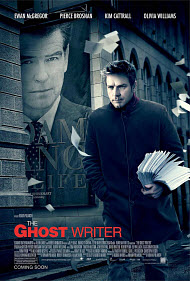

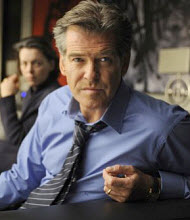

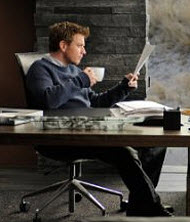
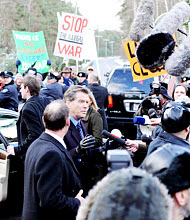
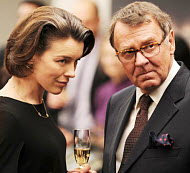
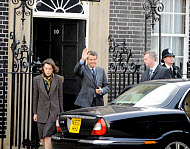

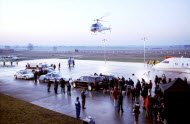
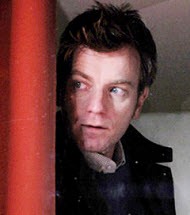
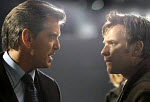

There was brief profanity and even briefer male nudity from a side view. I knew it was a Polanski movie, but I don’t recall seeing any of his other movies, so I really can’t say if it was typical. I saw absolutely no indication that Polanski had a bone to pick with the US government, and didn’t not consider it in the least an anti-war movie. …
My Ratings: Moral rating: Better than Average / Moviemaking quality: 4